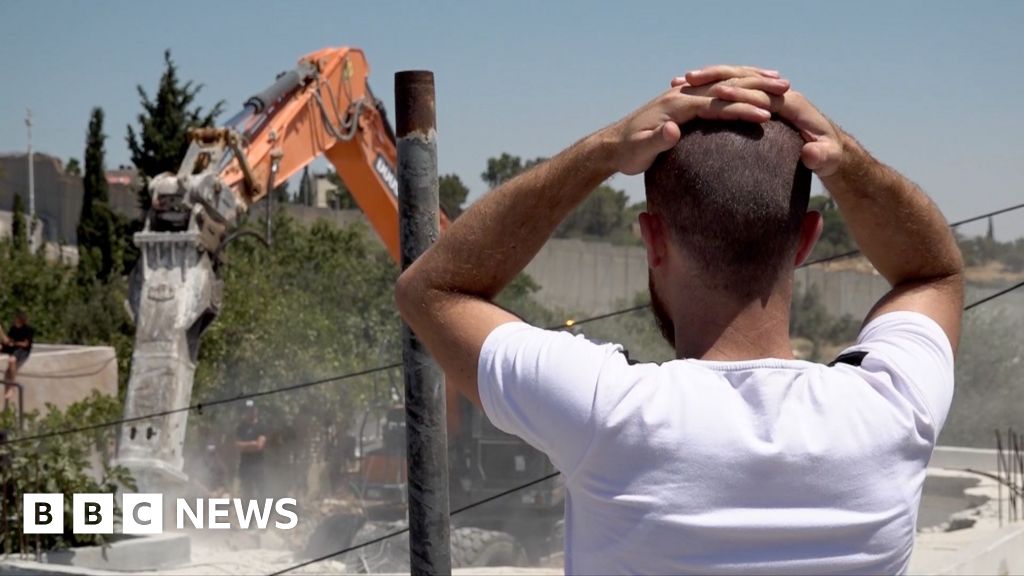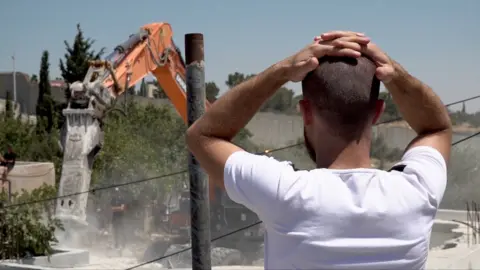 BBC
BBCWalking through the ruins of what used to be his home, 29-year-old Ahmad Musa al-Qumbar always feared the Jerusalem city authorities would come after him. The married Palestinian father-of-four built the modest single-storey building seven years ago, on land he owns and where his family have lived for generations.
But Ahmad never actually had a legal permit to build.
He lives in the Jabal Mukaber district of East Jerusalem. Within sight of the Old City and its many historic religious monuments, it is one of the most densely populated and fiercely contested parts of the region. It was captured by Israel from Jordan in the 1967 Middle East war, and later annexed, but is widely regarded internationally as Palestinian territory.
Control of Jerusalem is one of the most contentious issues of the decades-old conflict. Palestinians officially claim East Jerusalem as their capital, while Israel considers the whole of the city as its capital.
“Who” is allowed to build “where” in the city is a big part of that battle.
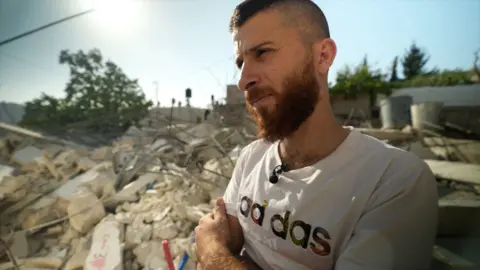
The rate at which Palestinian homes are being demolished in occupied East Jerusalem has almost doubled since the start of the conflict in Gaza, say human rights groups and monitoring organisations. The demolitions are ordered by the Israeli-run municipal authority which says that many buildings, like Ahmad’s, are illegally built without permission.
One NGO, Ir Amim, says that “under the cover of war”, Israel is “forcibly displacing Palestinians from their homes and the city”.
“I had to demolish my house after I was hit with penalties by the police and the Israeli courts,” Ahmad tells me as he stands in the rubble of what used to be his kitchen.
“I couldn’t pay the fines and risk losing things like healthcare and my child insurance. Of course, we appealed to the court, but they refused.”
Like many in the same situation, Ahmad reluctantly hired heavy machinery to knock down the house himself. He said that the Jerusalem City authorities would have charged him the equivalent of $100,000 (£75,600) if they’d carried out the order.
It made the job perhaps even more painful – tearing down his family’s labours and his children’s future with his own hands.
Almost all attempts by Palestinian families in East Jerusalem to apply for planning permission are rejected by the Israeli authorities. That means growing families say they have no choice but to build illegally and face the potential consequences – huge fines and demolition orders.
Some say the law and the courts are being deliberately used to suppress Palestinian growth and ambitions.
“These Palestinian communities ask for permission, and between 95% to 99% of the requests are denied,” says Shay Parnes, spokesperson for the Israeli human rights organisation B’Tselem.
“It has been happening for years,” continues Parnes.
“Sometimes they use security reasons to justify it, but it’s always under the same framework of expelling Palestinians… because the law is different for different communities who live side by side in the same city.”
On the predominantly Jewish Western side of the city, what used to be a skyline of relatively low, white-stone buildings has changed dramatically in recent years. Construction is booming. Cranes operate virtually 24/7 with new high-rise buildings, both residential and commercial, growing tall as that side of Jerusalem expands.
There’s been frenetic construction, too, in some areas of East Jerusalem where land has been claimed by Israel to make way for Jewish settlements. In Har Homa, an estimated 25,000 people now live in brand new homes on land formally expropriated by Israel in 1991.
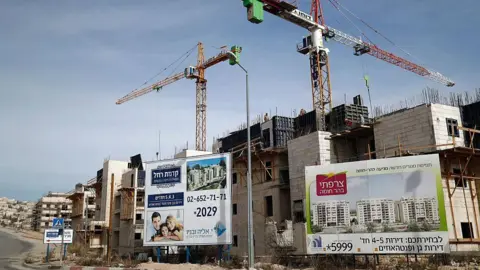 Getty Images
Getty ImagesJust across the road are the Palestinian villages of Umm Tuba and Sur Baher, where many public facilities are notably inferior to those in Har Homa.
In stark contrast to the building work on the other side of the highway, several homes have been forcibly demolished here in recent years in what Amnesty International describes as “a flagrant violation of international law and part of a systematic pattern by the Israeli authorities to forcibly displace Palestinians”.
It’s a similar picture in the settlement of Gilo, expanding rapidly in what is internationally regarded as occupied East Jerusalem, while, it’s argued, neighbouring Palestinian suburbs are denied the ability to grow at anything like the same rate.
The international community considers Israeli settlements in East Jerusalem illegal under international law, but the Israeli government disputes this. Israel also denies that demolitions are part of deliberate policy of discrimination that has gathered pace under the cover of the distraction of the Gaza war.
In a statement, the Jerusalem Municipality said the accusations were “absolutely false” and that it had local support for “comprehensive building and construction plans across nearly all areas of East Jerusalem”.
The plans “aim to provide options for neighbourhood expansion, address the widespread issue of illegal construction, and designate areas for the construction of municipal service structures,” it added.
But it isn’t hard to find examples where Israeli demolition orders against Palestinian homes are being enforced across East Jerusalem.
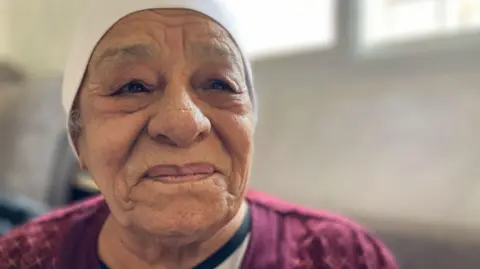
In the suburb of Silwan, just below the Old City, we found another Palestinian home in ruins. Lutfiyah al-Wahidi says the annexe had been built for her son’s family more than a decade ago but eventually the authorities came calling.
“Even if we build just one brick, the authorities come and demolish it. How did our house harm them? It’s on land that I doubt the authorities will ever be interested in.”
The grandmother says she has paid thousands of dollars in court fines over the years in a vain attempt to keep the property.
“My son has a family of six with only one provider. What harm are they doing, yet they still want to demolish it,” she says, her wider family now dispersed to other parts of the city.
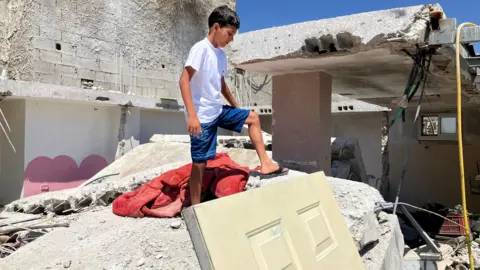
In a comprehensive policy brief, Ir Amim found that since the outbreak of the Gaza war on 7 October 2023, “there has been a major acceleration in the promotion and fast-tracking of new settlement plans in East Jerusalem and a dramatic spike in the rate of demolitions of Palestinian homes”.
“The Israeli government is clearly exploiting the war to create more facts on the ground,” it continues.
There are estimated to be at least 20,000 outstanding demolition orders in East Jerusalem – orders which have no expiry limit.
Many commentators have also observed that since 7 October, far-right members of Benjamin Netanyahu’s government and in the Jerusalem Municipality have become more confident in publicly expressing their intent to see more Jewish homes built on occupied or contested land.
While Palestinians, like Ahmad’s and Lutfiyah’s families, become noticeably more afraid of losing their homes, they insist they will stay and eventually rebuild their lives here in East Jerusalem.


